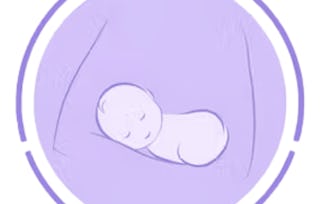In your previous course, you learned some medical interventions and skills to keep newborns healthy in the days and weeks after they have been born. In this course, you will learn what some additional skills that medical providers do to keep babies healthy. The Newborn Assessment Course will walk you through the physical examination from head to toe. You are going to learn that this is so much we can discover just by looking at a baby. And yes, we will be listening too, and discussing how medical equipment, such as a stethoscope or a pulse oximeter, can help in your exam. You will begin to be able to distinguish some normal findings from some abnormal findings.

The Newborn Assessment

The Newborn Assessment
This course is part of Newborn Baby Care Specialization



Instructors: Christine Gold
11,860 already enrolled
Included with
294 reviews
Skills you'll gain
Details to know

Add to your LinkedIn profile
7 assignments
See how employees at top companies are mastering in-demand skills

Build your subject-matter expertise
- Learn new concepts from industry experts
- Gain a foundational understanding of a subject or tool
- Develop job-relevant skills with hands-on projects
- Earn a shareable career certificate

There are 5 modules in this course
In all of the modules up until this one, we have discussed abnormalities or illnesses of newborns. In order to understand and recognize what is not normal, it is worthwhile to be clear on what is normal. In this module, Dr. Kohn will demonstrate how to examine a very well newborn. Aside from the obvious size differences and the unbelievable cuteness of newborns relative to adults, there are the influences of fetal development and transition that impact the newborn exam. Keep in mind that your exam may be the first physical evaluation that this baby has in its life!
What's included
6 videos3 readings1 assignment
Our task as providers of health care to newborns is to detect which of the many seemingly well babies has an underlying health care problem that needs to be addressed. Previously, we reviewed the screening method that we use to look for critical congenital heart disease. In this module, we will cover the surveillance technique, that is, the physical findings that should make us suspect a newborn might have congenital heart disease.
What's included
6 videos4 readings2 assignments1 discussion prompt
In this module, we will first identify normal components of the respiratory exam. We will use this information to recognize “abnormal” respiratory exams in newborns, meaning recognition of physical exam findings consistent with respiratory distress. Then, we will use the information we learned about the respiratory exam to work through a case of a newborn with respiratory distress
What's included
4 videos3 readings2 assignments
Nearly 41% of children who die under the age of 5 are less than 28 days old. The first month of life is a particularly vulnerable time for these little ones. In this module, you will learn some signs or symptoms that are concerning in newborns in the first month of life, and that need medical attention. You will also learn some common findings that are concerning to parents, but not concerning medically. Those are conditions for which reassurance and/or watchful waiting is appropriate. Distinguishing between concerning and benign conditions will help you ensure the safety and health of newborn babies!
What's included
6 videos6 readings1 assignment
In this module, we will learn all about newborn skin. This module will cover the basic terminology to describe different skin conditions and will help you recognize the most common newborn rashes and lesions that present in the first month of life. This is also where we will cover a few of the “must not miss” skin diagnoses that require further management by a dermatologist or medical professional.
What's included
4 videos2 readings1 assignment
Earn a career certificate
Add this credential to your LinkedIn profile, resume, or CV. Share it on social media and in your performance review.
Instructors


Offered by
Explore more from Public Health
 Status: Free Trial
Status: Free TrialUniversity of Colorado System
 Status: Free Trial
Status: Free TrialUniversity of Colorado System
 Status: Free Trial
Status: Free TrialUniversity of Colorado System
 Status: Free Trial
Status: Free TrialUniversity of Colorado System
Why people choose Coursera for their career

Felipe M.

Jennifer J.

Larry W.

Chaitanya A.
Learner reviews
- 5 stars
88.43%
- 4 stars
10.54%
- 3 stars
1.02%
- 2 stars
0%
- 1 star
0%
Showing 3 of 294
Reviewed on Sep 10, 2023
Great course, contains many interesting and necessary topics of the newborn, I definitely recommend.
Reviewed on Oct 15, 2021
i have learnt so much in a very short time while taking this course,knowledge is power and im so glad i had the opportunity to acquire this knowledge
Reviewed on Feb 14, 2023
I hope there can be more in-video questions to help me take notes. Some in-video questions appear before the content delivery which requires me to just guess. Some answers are wrong as well.

Open new doors with Coursera Plus
Unlimited access to 10,000+ world-class courses, hands-on projects, and job-ready certificate programs - all included in your subscription
Advance your career with an online degree
Earn a degree from world-class universities - 100% online
Join over 3,400 global companies that choose Coursera for Business
Upskill your employees to excel in the digital economy
Frequently asked questions
To access the course materials, assignments and to earn a Certificate, you will need to purchase the Certificate experience when you enroll in a course. You can try a Free Trial instead, or apply for Financial Aid. The course may offer 'Full Course, No Certificate' instead. This option lets you see all course materials, submit required assessments, and get a final grade. This also means that you will not be able to purchase a Certificate experience.
When you enroll in the course, you get access to all of the courses in the Specialization, and you earn a certificate when you complete the work. Your electronic Certificate will be added to your Accomplishments page - from there, you can print your Certificate or add it to your LinkedIn profile.
Yes. In select learning programs, you can apply for financial aid or a scholarship if you can’t afford the enrollment fee. If fin aid or scholarship is available for your learning program selection, you’ll find a link to apply on the description page.
More questions
Financial aid available,

